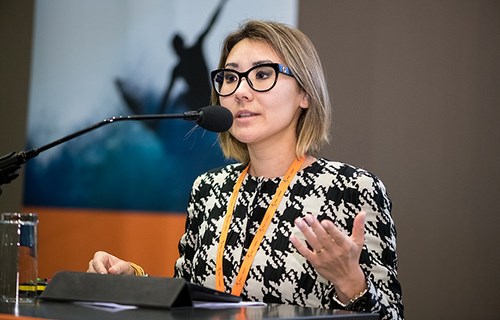Crime and corruption – from one c-word to another

Brazilian federal prosecutor Fabiana Schneider speaking at Play the Game 2017. Photo: Thomas Søndergaard/Play the Game.
27.11.2017
By Steve MenaryThe extent of the criminal involvement in sports was revealed by Fabiana Schneider, a federal prosecutor from the Federal Public Ministry in Brazil, who revealed that 3 billion euro had been reclaimed and more than 200 people arrested as part of 'Operation Carwash' into corruption surrounding the 2016 Olympic Games in Rio de Janeiro.
“It was the most important investigation in the history of Brazil as it reached all levels of power. This was old-style corruption using sophisticated tools to transfer the money via offshore accounts,” Schneider said.
As an example, Schneider showed the audience details of two bank transfers of $1.5 million and $500,000 respectively made to disgraced former International Athletics Association (IAAF) president Lamine Diack by an offshore company, Matlock, registered in the British Virgin Islands.
“Lobbying is the English word for corruption”
In a session called ‘International sport on trial: Which case for the prosecution’, Schneider was joined by another high-profile prosecutor; Jean-Yves Lourgouilloux from France’s Parquet National Financier (PNF).
The PNF is currently dealing with 20 cases of ongoing sports corruption. These include doping in Russian sport, bid rigging at the IAAF World Cup, the Olympics and the FIFA World Cup.
“One of our first questions was ‘is it possible to win a major sports competition without corrupting the voters?’,” said Lourgouilloux.
“We are starting to understand. Lobbying is the English word for corruption.”
Lourgouilloux praised the level of co-operation from Brazil in the PFN’s investigations but said that Senegal, where Diack remains in hiding from prosecution, was the “worst possible example”.
“They made it quite clear they would not co-operate with us,” he added.
The IAAF’s attempts to tackle the crisis in the governance of athletics were outlined by David Howman, chairman of the IAAF’s new Athletics Integrity Unit (AIU).
Howman outlined the AIU’s new code of conduct and independence, but agreed with the panel over the threats to sport.
“The world of sport is ripe for the plucking by the criminal underworld,” Howman said. “The sooner we deal with that the better. If we don't deal with it, it's going to creep and creep and creep and strangle us.”
Debate has moved from corruption to crime
Since Play the Game’s first conference, the debate has moved on from corruption to crime, said German journalist and blogger Jens Weinreich.
“When we started out at Play the Game, we were assaulted for using the C word – corruption. Now we are attacked for another C word – crime. Perhaps, before, we underestimated the level of crime involved.”
Weinreich was very critical of sports organisations’ ability to conduct independent investigations into crime or governance and said that there had never been any independent investigation from the Association of Summer Olympic International Federations (ASOIF), the Association of National Olympic Committees (ANOC) or the IOC. To claim that is a “joke” and “a lie”. Only journalists and prosecutors can work truly independently, he said.
Francesco Ricci Bitti, the ASOIF president was also on the seven-strong panel drawn from across the sports governance spectrum, and he presented results from a governance review conducted by ASOIF that revealed differing levels of governance in international sport.
According to the ASOIF review, 15 different international federations had no evidence of formal monitoring and 11 IFs had no confidential reporting mechanisms. Overall, 11 per cent of the ASOIF federations operated with term limits for officials but 92 did not impose term limits in their governance structures.
The question is where to apply pressure
The public response by sports bodies to media claims of corruption is being monitored in a new project at the school of criminal justice at the University of Lausanne in Switzerland.
Professor Stefano Caneppele provided preliminary data from a research project called ‘Database on Alleged Cases of Corruption in Sport’ (DACCS) research, which has identified 67 different stories in 114 countries. Most cases concern contracts, match-fixing and bid rigging and in the sports of football, tennis and athletics.
Poor governance leads to corruption and then crime, said Arnout Geeraert from KU Leuven, who developed Play the Game’s Sports Governance Observer, and said that despite improvements problems remain.
A lack of clearly defined sustainability requirements, insufficient procedures to prevent conflict of interest or policies from international federations to introduce good governance at a national level remained issues, said Geereart, who was critical of the IAAF for the lack of a transparent bid procedure for awarding a World Championships and only holding a congress every two years.
“The smallest Belgian sports association meets every two years, so why not the IAAF?” said Geereart, and added:
“Not everything is good but not everything is bad either. The problem now is to know where to apply the pressure.”

Read more about Play the Game 2017





